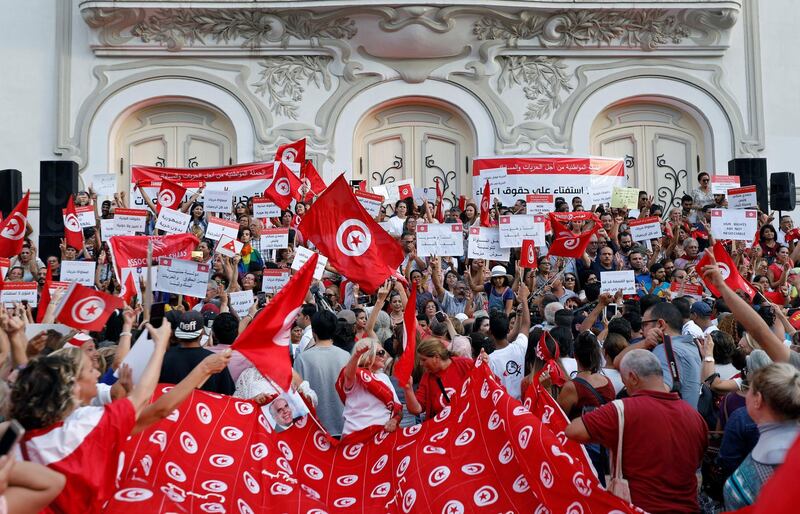Tunisia’s parliament will soon debate a bill to grant equal inheritance rights to men and women but the proposal has already polarised the North African country.
Under the current system, men receive twice the share of any inheritance granted to women. President Beji Caid Essebsi announced on Monday that he is preparing to submit a bill to parliament for a new inheritance law that will grant men and women equal right – unless otherwise stated by the giver.
For Tunisia, which has traditionally led the region in terms of women’s rights, the issue has proven a watershed moment. On Saturday, religious conservatives of both genders took to the streets in their thousands to oppose any bid to equalise the inheritance system.
Under the watchful eyes of heavy security, Tunisia’s conservative Muslims gathered outside parliament to vent their frustration over an issue deemed so controversial that it is rarely even debated within the region. “I'm here to defend the word of God and oppose any projects that harm the Islamic identity of our people," Kamel Raissi, a 65-year-old retiree said.
Then, two days later, women’s groups and civil society at large massed in their thousands to show support for equalising inheritance, as well as many of the recommendations contained in the report by the President’s Individual Freedoms and Equality Committee (COLIBE).
“We cannot accept in the 21st century, and in our constitution, this discrimination in the law,” said Nabila Hamza, one of the organisers of Monday’s march and co-founder of women’s rights group, the Tunisian Association for Democratic Women.
“The inheritance law is a significant barrier for women. It reduces their economic autonomy. Only 12 per cent [of Tunisian women] own a house and only 14 per cent own land. This impacts the access to women for property and credit,” she said.
_______________
Read more:
Tunis elects first female mayor
Tunisia's leading woman politician who found a second act after the revolution
_______________
At 91 years old, many have suggested that the bill may be an attempt by the president to secure his legacy. However, others are dubious over his motivations, as well as the limits to the kind of top-down reform that was commonplace in Tunisia’s autocratic past.
“The COLIBE report recommends a variety of things, not just equal inheritance. However, it’s this issue that the President has selected and chosen to take forward,” Hamza Meddeb, a research fellow specialising in Tunisian affairs at the European University Institute in Florence said.
He described it as a political gambit designed to mobilise his own party’s support ahead of next year’s elections and neutralise the opposition – a need compounded by an especially poor showing in May’s municipal elections.
For the President, preparing for an election period that he has yet to rule himself out of but in which he is unable to claim either political stability or economic success, the issue of identity could prove critical in defining himself and his party, Nidaa Tounes. It is a way of delineating them from the Islamists whose support has proven critical to their past survival. “Essentially, he’s played the identity card and is looking to mobilise his support around that,” Mr Meddeb said.
However, though Ennahda has yet to formally oppose the reform, both past rallies against the COLIBE report and the latest last Saturday served as an ample reminder that the Islamists are not without a popular base.
“The demonstrations have shown how risky this kind of division is,” Mr Meddeb said. “I want to be very clear, this could bring the consensus that has governed the country for the last four years to an end.”
For Tunisia, emerging after decades of autocracy and still acclimatising itself to rapid and occasionally unpredictable change, the shift from top-down reform to change from the streets is proving less than straightforward.
"This type of change reaches its peak in the transitional period between overthrowing the old regime and building the new order," Sociologist Tarek Belhadj Mohamed told The National. "The language, [they're using] lacks the minimums of discipline and political maturity and sense."
The rhetoric risks the new democracy and with it the “sacrifice of successive generations of Tunisians,” Mr Belhadj added.
But the issue speaks to the broader issue of identity and the public debate around it, says Mr Meddeb. “There’s this idea that the conversation about what Tunisia was and is ended with the passing of the 2014 Constitution. That wasn’t the end of the discussion at all, that should have been its start.”





